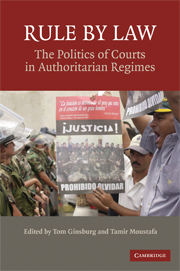Book contents
- Frontmatter
- Contents
- Contributors
- Introduction: The Functions of Courts in Authoritarian Politics
- 1 Of Judges and Generals: Security Courts under Authoritarian Regimes in Argentina, Brazil, and Chile
- 2 Administrative Law and the Judicial Control of Agents in Authoritarian Regimes
- 3 Singapore: The Exception That Proves Rules Matter
- 4 Agents of Anti-Politics: Courts in Pinochet's Chile
- 5 Law and Resistance in Authoritarian States: The Judicialization of Politics in Egypt
- 6 Courts Out of Context: Authoritarian Sources of Judicial Failure in Chile (1973–1990) and Argentina (1976–1983)
- 7 Enforcing the Autocratic Political Order and the Role of Courts: The Case of Mexico
- 8 The Institutional Diffusion of Courts in China: Evidence from Survey Data
- 9 Building Judicial Independence in Semi-Democracies: Uganda and Zimbabwe
- 10 Judicial Power in Authoritarian States: The Russian Experience
- 11 Courts in Semi-Democratic/Authoritarian Regimes: The Judicialization of Turkish (and Iranian) Politics
- 12 Judicial Systems and Economic Development
- 13 Courts in Authoritarian Regimes
- References
- Index
10 - Judicial Power in Authoritarian States: The Russian Experience
Published online by Cambridge University Press: 05 June 2012
- Frontmatter
- Contents
- Contributors
- Introduction: The Functions of Courts in Authoritarian Politics
- 1 Of Judges and Generals: Security Courts under Authoritarian Regimes in Argentina, Brazil, and Chile
- 2 Administrative Law and the Judicial Control of Agents in Authoritarian Regimes
- 3 Singapore: The Exception That Proves Rules Matter
- 4 Agents of Anti-Politics: Courts in Pinochet's Chile
- 5 Law and Resistance in Authoritarian States: The Judicialization of Politics in Egypt
- 6 Courts Out of Context: Authoritarian Sources of Judicial Failure in Chile (1973–1990) and Argentina (1976–1983)
- 7 Enforcing the Autocratic Political Order and the Role of Courts: The Case of Mexico
- 8 The Institutional Diffusion of Courts in China: Evidence from Survey Data
- 9 Building Judicial Independence in Semi-Democracies: Uganda and Zimbabwe
- 10 Judicial Power in Authoritarian States: The Russian Experience
- 11 Courts in Semi-Democratic/Authoritarian Regimes: The Judicialization of Turkish (and Iranian) Politics
- 12 Judicial Systems and Economic Development
- 13 Courts in Authoritarian Regimes
- References
- Index
Summary
Like their democratic counterparts, authoritarian rulers need effective courts to perform the basic functions of courts – to resolve disputes, to impose social control, and to regulate at least aspects of public life (Shapiro 1981). At the same time, these rulers are often reluctant to endow courts with significant power in the form of politically sensitive jurisdiction and the discretion to make far-reaching choices. Yet, the record shows that some authoritarian regimes – for example, well-established or liberalizing ones – do entrust their courts with such responsibilities for holding public administration accountable, managing major commercial conflicts, and even maintaining quasi-constitutional order (Moustafa 2005; Ginsburg 2006). Under what circumstances authoritarian rulers opt for judicial power and with what risks, consequences, and compromises are questions ripe for comparative study.
This chapter examines the experience of three Russian states – Tsarist Russia (from the Judicial Reform of 1864); the USSR (including the late period of liberalization); and post-Soviet Russia (a hybrid regime that moved from electoral democracy to electoral or competitive authoritarianism). The chapter begins with two theoretical issues – (1) judicial independence and its relationship to judicial power and (2) distinctions among types of authoritarian regimes.
THEORETICAL PERSPECTIVES
At least in authoritarian states, judicial independence is not a given. Traditionally, European autocrats retained for themselves the right to dismiss judges whose decisions they disliked (until the seventeenth century, judges in England served “at the pleasure of the King”; Shapiro 1981: 91).
- Type
- Chapter
- Information
- Rule by LawThe Politics of Courts in Authoritarian Regimes, pp. 261 - 282Publisher: Cambridge University PressPrint publication year: 2008
- 9
- Cited by

